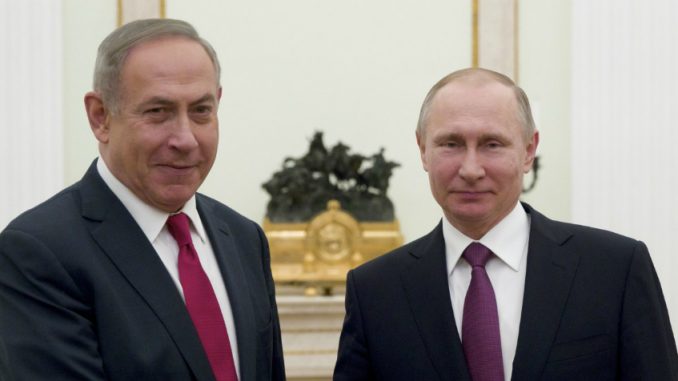
Israel’s Prime Minister Benjamin voiced concerns about Iran’s growing power in Syria during his meeting with the Russian president Vladimir Putin on Thursday in Moscow.
Israeli Prime Minister Binyamin Netanyahu met with Russian President Vladimir Putin in the Kremlin in Moscow Thursday as part of a state visit amid warming relations between the two countries.
Ahead of his closed-door meeting with Putin, Netanyahu addressed journalists, discussing shared threats facing the Russian and Israel, as well as the expanding partnership the Prime Minister described between the two nations.
Before the meeting, Russian President Vladimir Putin and Israeli leader Benjamin Netanyahu were scheduled to meet to discuss “joint efforts against international terrorism” and “key aspects of the Palestinian-Israeli settlement,” according to a Kremlin statement.
ISIS shouldn’t be replaced by Iran
Israel has been concerned about Iran’s growing military power, in addition to the militias, it controls in Syria, which allowed Tehran to widen its influence in the region.
In particular, Israelis are also concerned about Iran and Hezbollah’s expanding ground operations in the Golan Heights, which Tel Aviv considers a major security threat.
At the start of his meeting with Putin, Netanyahu noted the significant progress made by Russia and other players in the region in fighting Islamist militant groups, including the Islamic State and al-Qaeda. He added, however, that “the victory over the terrorism of ISIS cannot lead to an upsurge in terrorism by Iran and its proxies. We will not exchange terrorism for terrorism.”
Netanyahu continued: “I want to say clearly that Israel is today a state with an army, and we are able to defend ourselves. Extreme Shia Islamic terror does not only threaten Israel, but rather the region and the world. I know that we are partners in the desire to prevent any victory for Islamic terror, from any direction.”
“They want to end Israel, it is written on their ballistic missiles.”
Although Russia is unhappy with some of Iran’s strategic objectives in a postwar Syria, it is unclear how far Putin would go in supporting Israeli action to prevent Iran from building a sphere of influence from Tehran to Lebanon, via Syria and Iraq.
“Syria is at a crossroads right now, on one side, there is a cease-fire that seems to be holding and Assad has managed to regain control of parts of his country. Israel is worried that Iran and its proxies will gain a permanent foothold in Syria,” said senior Israeli minister Tzachi Hanegbi, a close ally of Netanyahu.
While refraining from commenting on the war in Syria, Israel is believed to have carried out unclaimed airstrikes inside Syria targeting suspected Iranian and Hezbollah weapons storage sites and missile depots in recent years. Russia has turned a blind eye to the strikes.
Putin, who has made support for Assad a cornerstone of his policy, would probably be unwilling to go beyond that and support an Israeli incursion.
“Given all this, it is hard to see what Putin could promise to Netanyahu,” an analyst said. “He might, and likely will, promise a lot, but is in no position to deliver.”
Concerns regarding Russian missiles
Other than Iran’s presence in Syria, Israel is also concerned by the deployment of Russian arms to Iran, especially the S-300 missile system which was deployed and tested recently, and didn’t role out military actions against Iran if they were needed.
Iran’s armed forces said earlier in March it has conducted a test of the Russia-supplied S-300 long-range surface-to-air missile system, which was bought recently from Russia, during its latest military drills while Israel voiced concerns over the incident
Israel had long sought to block the S-300 missiles sale to Iran, and remains concerned that Iran will violate the international accord signed with world powers aimed at preventing it from developing nuclear weapons. Jerusalem is also concerned that the S-300 might have an effect on Israel’s air superiority in the region.
Sources in Israel said they are cautiously monitoring the situation. According to Abraham Assael, a former IDF brigadier-general, the S-300 technology cannot be ignored.
“The S-300 advanced missile defense system is a system that wasn’t there before and which is very dangerous,” Assael told The Jerusalem Post.
Israel’s Air Force recently received the F-35, which according to senior Israeli officials, will give Israel complete air superiority in the region for the next 40 years. Israel is set to receive two full squadrons of the F-35 by 2022 and with an extremely low radar signature, it is able to operate undetected deep inside enemy territory as well as evade advanced missile defense systems like S-300s, according to Israeli sources.
In addition, the notion of Iran developing its own advanced missile defense system is not surprising, Assael said.
“The Iranians are well-advanced in their technology. In the last decade or two we can say that they developed a lot, especially in the field of rockets,” the retired general said, adding that while it takes time to develop a complex system, the Iranians are very capable of developing a system even more advanced than the S-300.
According to Assael, “if tomorrow we wanted to strike Iran, and I’m not saying that we do, we now need to take into consideration that Iran now has a very good anti-aircraft system.”
Iran’s reportedly successful testing and subsequent operational status of the system comes amid mounting tensions between Tehran and Washington.
Iran’s Supreme Leader Ali Khamenei has dismissed calls from US President Donald Trump’s administration to stop testing ballistic missiles and in February, Mojtaba Zonour, a member of Iran’s National Security and Foreign Policy Commission and a former Islamic Revolution Guards Corps official, warned that an Iranian missile could hit Tel Aviv in under seven minutes.
